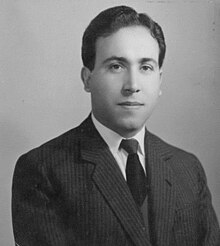Fuad al-Rikabi | |
|---|---|
| فؤاد الركابي | |
 | |
| Minister of Rural Affairs | |
| In office November 1964 – 10 July 1965 | |
| Prime Minister | Tahir Yahya |
| Preceded by | Post established |
| Succeeded by | Ahmad 'Abd al-Hadi al-Habboubi |
| Minister of Development | |
| In office 14 July 1958 – 7 February 1959 | |
| Prime Minister | Abd al-Karim Qasim |
| Preceded by | Post established |
| Succeeded by | Talat al-Shaybani |
| Regional Secretary of the Regional Command of the Iraqi Regional Branch | |
| In office 1954 – 29 November 1959 | |
| National Secretary | Michel Aflaq |
| Preceded by | Fakhri Qadduri |
| Succeeded by | Talib Hussein ash-Shabibi |
| Member of the National Command of the Arab Socialist Ba'ath Party | |
| In office June 1954 – August 1960 | |
| Member of the Regional Command of the Iraqi Regional Branch | |
| In office December 1955 – 29 November 1959 | |
| Personal details | |
| Born | 1932 Nasiriyah, Kingdom of Iraq |
| Died | December 1971 Baghdad, Ba'athist Iraq |
| Political party | Iraqi Regional Branch of the Arab Socialist Ba'ath Party (1951–1961) Arab Socialist Union |
| Religion | Shia Islam |
Fuad al-Rikabi (Arabic: فؤاد الركابي, romanized: Fuʾād al-Riqābī; 1932 – December 1971) was an Iraqi politician and the founder of the Iraqi Regional Branch of the Arab Socialist Ba'ath Party. Al-Rikabi became the Secretary of Iraqi Regional Command of the Ba'ath Party in 1954 and held the post until 1959. Throughout his term of leadership, the Iraqi Regional Branch expanded its membership and became a leading party in Iraq's political landscape. Following the 14 July Revolution of 1958 which toppled the monarchy, al-Rikabi was appointed Minister of Development in Abd al-Karim Qasim's unity government.
As soon as the government was established, a power struggle quickly began between Qasim, an Iraqi nationalist who was supported by the Iraqi Communist Party, and Abdul Salam Arif, an Arab nationalist. Al-Rikabi supported the latter. Along with other cabinet members, al-Rikabi resigned in protest when Arif lost the power struggle in late 1958. Al-Rikabi and the Iraqi Regional Branch of the Ba'ath Party came to the conclusion that the only way to expedite Iraq's entry into the United Arab Republic was to assassinate Qasim. The assassination attempt failed, and most of the leading Ba'athists and co-conspirators, including al-Rikabi, fled to Syria. Shortly after, on 29 November 1959, the Iraqi Regional Command was dissolved.
Al-Rikabi supported the Nasserist faction—supporters of Gamal Abdel Nasser—in a power struggle within the Ba'ath Party in the late 1950s against the Aflaqites, supporters of Michel Aflaq. He agreed with Abdullah Rimawi's observation that the National Command, the ruling organ of the Ba'ath Party, had deviated from Ba'athist thought. Al-Rikabi tried but failed to get the Iraqi Regional Branch of the Ba'ath Party to break away from the National Command, and on 15 June 1961 he was expelled from the party. From then on al-Rikabi was a prominent Nasserite, active first in Rimawi's Revolutionary Ba'ath Command and then in Arif's Arab Socialist Union. Following the Ba'ath Party's seizure of power in the 17 July Revolution of 1968, al-Rikabi was arrested. He was killed by fellow inmates according to an official account, media unaffiliated to the Iraqi state claimed he was killed by the Iraqi security services.